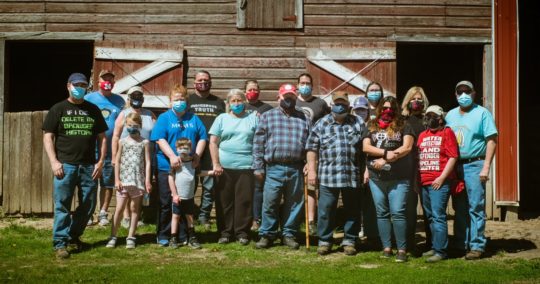Last week the Cornell University Global Labor Institute published an extensive report about the true job numbers associated with Keystone XL. They confirm what we’ve suspected for a long time: TransCanada and their contractors use junk math to inflate their numbers. In fact, the pipeline could destroy more jobs than it creates. Our state and our country deserve to make this decision based on sound facts, not industry-generated numbers based on half-truths.
Here is the overview that the researchers sent out with a link to the full report at the bottom:
Pipe Dreams? Jobs Gained, Gobs Lost by the Construction of the Keystone XL
Report Overview
TransCanada, the American Petroleum Institute and other proponents of the Keystone XL (KXL) pipeline claim KXL will be a $7 billion boon to the U.S. economy, creating 20,000 direct construction and manufac-turing jobs and 119,000 indirect jobs. Cornell Global Labor Institute’s (GLI) analysis of the project has found that these numbers are unsubstantiated, and that the project will produce far fewer jobs than they claim. In fact, the construction of KXL may destroy more jobs than it creates.
American needs a jobs plan, but KXL is not it. Here’s why:
KXL’s U.S. Project Budget is $3.3 billion, NOT $7 billion: TransCanada claims that KXL is a $7 billion project. TransCanada arrives at this figure by including $1.6 billion that will be spent in Canada and approximately $2.6 billion that has already been spent or committed, including on steel pipe manufactured outside the U.S. A much smaller project budget means a lot less jobs.
U.S. Manufacturing Jobs? Think again. Steel pipe is the main material input for KXL. To date, TransCanada has had almost 50% of the pipe manufactured outside the U.S., even though they claim KXL will create 20,000 direct construction and manufacturing jobs in the U.S. TransCanada is having the same multi-national corporation, based in India, manufacture the pipe for KXL as they did for Phase 1 and 2. This company, Welspun, is being investigated for producing sub-standard steel that led to spills and leaks in other pipeline projects. Plus, TransCanada has procured this pipe even though they have not received a Presidential Permit to construct KXL.
KXL Will Increase Fuel Prices in the Midwest, Hurting Consumers and Destroying Jobs. KXL will divert tar sands oil from Midwest refineries to refineries in the Gulf Coast where the oil will sell for a higher price. Tar Sands oil will also be available for export to countries like China where the demand for oil is growing rapidly. TransCanada states that KXL will increase the price of heavy crude oil in the Midwest by almost $2 to $4 billion annually. Top energy economists believe Midwestern consumers may end up paying 10-20 cents more for a gallon of gas as a result of tar sands oil being diverted to refineries in Texas. Just one year of fuel price increases as a result of KXL could cancel out some or all of the jobs created by KXL, based on the $3-$4 billion budget.
Oil Spills, Pollution and Climate Change Cost Jobs Too! The industry has ignored or dismissed fears that KXL will have a serious impact on our environment and our economy through inland spills, spills into freshwater supplies (principally the Ogallala Aquifer) or increases in greenhouse gas emissions and other forms of pollution. But clean-up operations, permanent spill damage to sectors like agriculture and tourism, and rising emissions and other pollutants incur costs and divert public and private funds away from productive economic activity. For Phase 1 of Keystone, TransCanada claimed 11 spills could be expected over a 50 year period–over 30 spills have occurred on the Keystone pipeline just in its first year of operation in Canada and the U.S.
KXL Jobs Are Temporary and Non-Local. Only 10-15% of the total KXL workforce is expected to be hired locally. Based on information provided by TransCanada to the State Department, a state-by-state jobs breakdown reveals that Keystone XL will create very few jobs in the states along the pipeline (e.g., 6-18 jobs in Kansas; 90-248 jobs in Nebraska; and 41-113 jobs in Oklahoma). Plus, these construction jobs will disappear after the completion of the project.
Industry Study Exaggerates Job Estimates: The industry’s claim that KXL will create 119,000 total jobs (direct, indirect and induced) is based on a poorly documented study commissioned by TransCanada (The Perryman Group study). The Perryman study is not transparent and does not include basic information on the overall cost of the project and input data from TransCanada. In short, the Perryman Study does not provide enough information to know how the estimated job impacts were calculated.
The full report can be downloaded here: http://www.ilr.cornell.edu/globallaborinstitute/research/upload/GLI_KeystoneXL_Reportpdf.pdf



